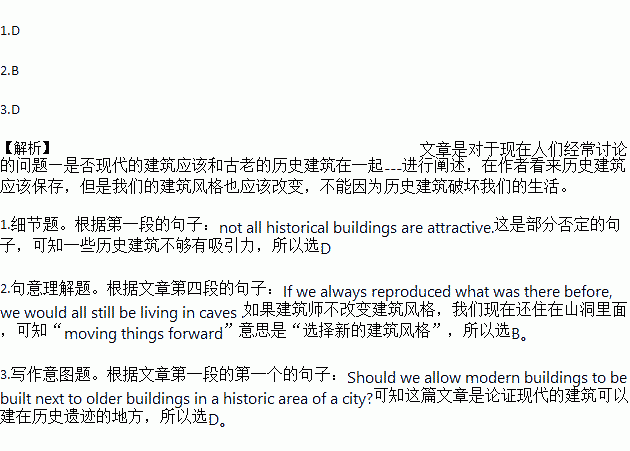题目内容
Should we allow modern buildings to be built next to older buildings in a historic area of a city? In order to answer this question, we must first examine whether people really want to preserve the historic feel of an area. Not all historical buildings are attractive. However, there may be other reasons --- for example, economic reasons --- why they should be preserved. So, let us assume that historical buildings are both attractive and important to the majority of people. What should we do then if a new building is needed?
In my view, new architectural styles can exist perfectly well alongside an older style. Indeed, there are many examples in my own home town of Tours where modern designs have been placed very successfully next to old buildings. As long as the building in question is pleasing and does not dominate (影响) its surroundings too much, it often improves the attractiveness of the area.
It is true that there are examples of new buildings which have spoilt (破坏) the area they are in, but the same can be said of some old buildings too. Yet people still speak against new buildings in historic areas. I think this is simply because people are naturally conservative(保守的)and do not like change.
Although we have to respect people’s feelings as fellow users of the buildings, I believe that it is the duty of the architect and planner to move things forward. If we always reproduced what was there before, we would all still be living in caves. Thus, I would argue against copying previous architectural styles and choose something fresh and different, even though that might be the more risky choice.
1.What does the author say about historical buildings in the first paragraph?
A. They have nothing to do with the historic feel of an area.
B. Most of them are too expensive to preserve.
C. They are more pleasing than modern buildings.
D. Some of them are not attractive.
2.By “move things forward” in the last paragraph, the author probably means“_______”
A. Destroy old buildings
B. Choose new architectural styles
C. Put things in a different place
D. Respect people’s feelings for historical buildings
3.What is the main purpose of the passage?
A. To explain why people dislike change.
B. To warn that we could end up living in caves.
C. To admit how new buildings have ruined their surroundings.
D. To argue that modern buildings can be built in historic areas.
 海淀黄冈名师导航系列答案
海淀黄冈名师导航系列答案 普通高中同步练习册系列答案
普通高中同步练习册系列答案| A. | can | B. | could | C. | might | D. | shall |
 I often read of incidents of misunderstanding or conflict.I'm left(36)puzzled.Why do these people create mistrust and problems,especially with those from other(37)races?
I often read of incidents of misunderstanding or conflict.I'm left(36)puzzled.Why do these people create mistrust and problems,especially with those from other(37)races?I was growing up in Kuala Lumpur in the early 1960s,(38)when children from different races and religions played and studied (39)together in harmony.At that time my family lived a stone's (40)throw from Ismail's.And no one was bothered that Ismail was a Malay Muslim and I was an Indian Hindu-we just (41)accepted our differences.Perhaps,our elders had not filled our heads with unnecessary advice,well (42)meant or otherwise.
We were nine when we became friends.During the school holidays,we'd (43)explore the countryside on our bicycles,hoping to (44)come across the unexpected.At times Ismail would accompany my family as we made a rare shopping trip to town.We would be glad of his (45)company.
When I was twelve,my family moved to Johor.Ismail's family later returned to their village,and I (46)lost touch with him.
One spring afternoon in 1983,I stopped a taxi in Kuala Lumpur.I (47)stated my destination.The driver acknowledged my (48)instructions but did not move off.Instead,he looked (49)fixedly at me."Raddar?"he said,using my childhood nickname (绰号).I was astonished at being so (50)familiarly addressed (称呼).Unexpectedly!It was Ismail!Even after two (51)decades we still recognized each other.Grasping his shoulder,I felt a true affection,something (52)hard to describe.
If we can allow our children to be (53)themselves without prejudice,they'll build friendships with people,regardless of race or religion,who will be (54)by their side through thick and thin.On such friendships are societies built and (55)then we can truly be,as William Shakespeare once wrote,"We happy few.We band of brothers".
| 36.A.interested | B.pleased | C.puzzled | D.excited |
| 37.A.parties | B.cities | C.villages | D.races |
| 38.A.why | B.which | C.how | D.when |
| 39.A.together | B.around | C.alone | D.apart |
| 40.A.drop | B.throw | C.move | D.roll |
| 41.A.refused | B.made | C.sought | D.accepted |
| 42.A.paid | B.meant | C.preserved | D.treated |
| 43.A.explore | B.search | C.discover | D.desert |
| 44.A.get through | B.deal with | C.come across | D.take away |
| 45.A.arrival | B.choice | C.effort | D.company |
| 46.A.lost | B.gained | C.developed | D.missed |
| 47.A.stated | B.ordered | C.decided | D.chose |
| 48.A.attempts | B.instructions | C.opinions | D.arrangements |
| 49.A.anxiously | B.carelessly | C.disappointedly | D.fixedly |
| 50.A.familiarly | B.strangely | C.fully | D.coldly |
| 51.A.departures | B.months | C.years | D.decades |
| 52.A.possible | B.funny | C.hard | D.clear |
| 53.A.them | B.themselves | C.us | D.ourselves |
| 54.A.from | B.by | C.with | D.against |
| 55.A.still | B.otherwise | C.then | D.instead. |
| A. | developed | B. | being developed | ||
| C. | having developed | D. | to develop |


 ght back. The 8. (hard) you try to beat him, the more likely you will get hit. He controls you!
ght back. The 8. (hard) you try to beat him, the more likely you will get hit. He controls you!